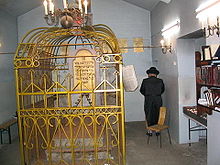Elimelech of Lyshansk
Rabbi Elimelech of Lyschansk (born 1717 ; died 1787 in Leżajsk , Poland) was a Hasidic rabbi and tzaddik and one of the founders of Hasidism in Galicia .
Life
Elimelech was a student of Dow Bär von Mesritsch . With his brother Sussja von Hanipol (Polish: Annopol ) he traveled from village to village. After Dow Bär's death in 1772, he settled in Stetl Lyschansk , Galicia , which subsequently became an important Hasidic center. He ran a court funded by pidjonot ("ransom"): a system of internal taxes paid to the tzaddik, often accompanied by kwitlach ("receipts") on which the Hasidim wrote down their material and spiritual problems the hope that these would be resolved by the tzaddik. In his letters Elimelech defends himself against the allegations of the Mitnagdim (opponents of the Hasidim) that the Hasidim adhere to the Sephardic rite of Isaac Luria in their liturgy and cites Josef Karo and Moses Isserles as his support . His tomb in Leżajsk is still a pilgrimage destination for supporters of Hasidism, especially on the day of his death, the 21st Adar .
His teachings
In contrast to the view that the tzaddik was only a spiritual leader, Elimelech took the view that the tsaddik's leadership role extended to all areas of life. The tzaddik must live in the dialectical tension between Dewekut ( devotion to God) and the pragmatic, realistic needs of society. According to Elimelech, the tzaddik has a higher spiritual status than seraphim and forms the basis of the world. The authority of a Hasidic leader arises from his direct relationships with higher powers, from whom he is supported in his endeavors for the well-being of the individual and the community: "Every utterance of the tzaddik creates an angel and influences higher spheres" (in his collection of sermons Noam Elimelech , Lwow 1787). Excessive enthusiasm could endanger the tzaddik's life. That is why he is reassured in his devotion to God in order not to die in the ecstasy of his mystical experiences.
Devotion to God is not a steady state, but is characterized by ascent and descent. In the "Descent of the Tzaddik " ( Hebrew Nefilat ha-zadik ) Elimelech puts the emphasis on the descent for the purpose of Tikkun , the "restoration of the original divine world order". This descent is seen as a voluntary process. The tzaddik knows that he has to improve his community and therefore goes to its level in order to lift it up. As a result, evil thoughts are sublimated or increased, which ultimately leads to the personal salvation of the individual. Elimelech's answer to the question of the problem of evil is to sanctify material things and to resist temptation. The tzaddik must overcome the dualism between good and evil by transforming evil into good. This process brings about the appearance of the Messiah when all return to their original oneness. What is new about this teaching is the spiritual renewal of man and the revelation of internal aspects of the Torah that were not revealed at Sinai . Among the students of Elimelech were Jaakow Jizchak Horowitz , the "Seer of Lublin", and Abraham Jehoshua Heschel of Apta .
It seems that Elimelech could not live up to the standards he had set himself. Towards the end of his life he withdrew from his disciples and also neglected the spiritual guidance of his community.
literature
- Encyclopedia Judaica , Vol. 6, pp. 661-663.
Web links
Footnotes
- ↑ Martin Buber: The hidden light . Rütten & Loening, Frankfurt am Main 1924, p. 210.
| personal data | |
|---|---|
| SURNAME | Elimelech of Lyshansk |
| BRIEF DESCRIPTION | Hasidic rabbi and tzaddik and one of the founders of Hasidism in Galicia |
| DATE OF BIRTH | 1717 |
| DATE OF DEATH | 1787 |
| Place of death | Leżajsk , Poland |
